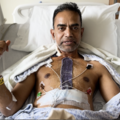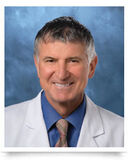“Even Though I’m Already Diagnosed With Mitral Regurgitation, Is It Possible I Will Never Need Heart Valve Surgery?” Asks Debby
By Adam Pick on May 9, 2011
While at the Mitral Conclave, I was fortunate to meet with Dr. Kevin Accola, a leading mitral valve surgeon from Orlando, Florida. During our discussion, I asked Dr. Accola a question submitted by Debby about mitral valve repair. (Click here to learn about mitral valve repair operations.)
Debby asked, “I was diagnosed with a severe mitral regurgitation disorder over 5 years ago. Now, at 42, I have no symptoms or health concerns. Is it possible that I will never need a mitral valve repair? Or, is that wishful thinking?”
Thanks to Debby for her question. And, a special thanks to Dr. Kevin Accola for sharing his clinical expertise with us!
For those of you who are hearing impaired, please find below a transcript of our discussion.
Adam: Hi, everybody. It’s Adam and I’m coming to you from Mitral Conclave in New York and I’m thrilled to be standing next to Dr. Kevin Accola who’s practicing out of Orlando in Florida. We have a question for Dr. Accola that comes in from Debbie and she says, “I was diagnosed with severe mitral valve regurgitation over five years ago. I’m now 42 and I have no other symptoms or health concerns. My question is: Could it be possible that I will never need a mitral valve repair or mitral valve replacement or is that wishful thinking?”
Dr. Accola: Adam, that’s a great question because about 15% of women have some form of mitral valve prolapse. Sometimes it’s severe. Sometimes it’s not. Sometimes it’s just a little bit of a prolapse where the heart valve isn’t even leaking. Unfortunately, Debbie, since she does have some regurgitation already, in all probability this may go on to progress particularly as she ages and there’s something wrong inherently with the valve that will allow the valve to become more prolapsed and it will continue to leak. She’s right on track by continuously every six months or four to six months getting an echo to monitor the amount of leak as well as the progression of the valve disease. We want to make sure that her left atrium doesn’t begin to get enlarged. That can precipitate atrial fibrillation. We want to make sure that her ventricular function stays intact and it doesn’t start to become dilated or weaker. So she’s doing all the right things, Adam. I think that’s it’s important that she stays active and that she doesn’t become paralyzed by this because if it does progress, particularly before a lot of symptoms, I’d recommend that Debbie sees a cardiovascular surgeon and even considers, if it is a very highly likely repairable valve, that a valve repair may be in her best option. But to answer her initial question, as long as she’s not having symptoms and the valve isn’t leaking severely, if she doesn’t have a real mechanical problem with the valve, she may be able to go for some time. But she’s doing all the right things, getting it frequently checked, staying active, continuing to watch her other health concerns, but I would continue to impress upon her that she just needs to have this followed.
Adam: Great. Well, there you have it. Dr. Accola, I just want to thank you for all of your help…
Dr. Accola: Oh, it’s my pleasure.
Adam: You’ve done incredible things for a lot of the patients and the caregivers out there. I just really want you to know how much we appreciate your pursuit of healthy hearts and healthy heart valves.
Dr. Accola: Well, we appreciate you, Adam. A lot of the things you’ve done from a grassroots movement. The patients want to hear from people like you that have not only experienced heart surgery but from that side of the fence because we can tell them statistically and from a medical perspective, but you can tell them from the heart, so to speak. So I think it’s so important that they hear things from you because you can tell them, you know, okay, this is the real deal. Regardless of statistics and everything else, you can share with them your experience so that’s huge and I want to just thank you doing all you do.
Adam: Thank you so much. Well, our guest, Dr. Kevin Accola, you can learn more about him our Surgeon Finder. Thanks.
Keep on tickin!
Adam
|
Nupur says on May 10th, 2011 at 2:00 pm |
|
This is a very interesting question and something that many of us in the “waiting room” deal with. My regurgitation is is moderate severe and I have some symptoms (trouble walking uphill), funny feeling with moderate exercise, and so on. I am not sure how important these “symptoms” are, since after being diagnosed I am so aware of these things and I tend to worry and make them worse. My cardiologist does not think it is time yet but I am so tired of guessing if something is a symptom or not and watching out for changes that I’d rather just have it done and over with! The only reason that favors waiting is that my prolapse (in the anterior leaflet) is hard to repair and at 44 I am sure to get a mech valve and I don’t want to be on Wafarin. So I’d like to know what it really means when doctors say “as long as you are not having symptoms”, since our body adjusts to symptoms and we accept it as age and lesser conditioning. I personally don’t like monitoring my “symptoms” : ) |
 |
|
Duane Hunt says on May 12th, 2011 at 10:17 pm |
|
That’s my doc! Love Dr. A!! I found Dr. Accola via my initial research on the HVS website and blog and am very grateful. |
 |
|
Doreen Casey says on May 15th, 2011 at 6:52 pm |
|
Adam: I had an echo to watch for Pulmonary Hypertension that sarcoidosis patients can get. What they found was a thickend and possibly calcified tricuspid valve with mod regurge, a thickened mitral valve (no prolapse) with mod. regurge and pulm artery pressures of 40-50. My echo 18 mos ago showed trivial and minimal regurge respectively, but the pressure was 25-30 and my valves were normal. I am 48. Have you seen this with these valves and am I looking at possible valve replacement in the future? Sincerely, |
 |
|
Rebecca Roberts says on May 21st, 2011 at 6:35 pm |
|
Nupur: I had a successful repair of the anterior leaflet of my mitral valve. Keep looking until you find a surgeon with an excellent repair rate for this problem. Prior to surgery, my surgeon said he was 90% certain he could do a repair of my valve. |
 |
|
Gloria Savannah-Austin says on July 28th, 2015 at 5:20 pm |
|
Dear Doreen and Adam Pick- I am curious if there was ever any information on your calcified tri-cuspid valve and it’s possible relation to your Sarcoidosis. I was diagnosed with Sarcoidosis in 2009- after 18 months of drug therapy (High Doses of Cortisone) I went on with my life, but in early 2011 had a health check up- and they found a Right Brundle Branch Block- (also related to sarcoidosis) and then subsequently going to a cardiologist they found a Mitral Valve Regurg. and also an Aortic Regurgitation and Stenosis. It is something that I strongly suspect is related to the Sarcoid almost 7 years ago- the RBB didn’t show up on an EKG in 2008 at the beginning of the several months of testing etc. to get to the correct diagnosis of Sarcoidosis (they originally thought it was lung cancer) well anyways- glad it was Sarc not the BIG ‘C’. One of the reasons I was drawn to Dr. Accola was his also being an expert in the lungs- as I do have some diminished lung capacity- that I knew I would be in good hands no matter what….with the heart and the lungs- plus seeing his videos he has an awesome personality and bedside manner. It is going to be a little while yet before I can go and consult with him, have another check up in September – Aortic Regurg is at a severe level, but still need a higher ejection fraction before Cardiologist says it’s time. Spending a bit of time just researching the Sarcoid connection and saw this post from 4 years ago and it got me thinking again on how al the health things we experience are inter-related and connected. Just hopeful and sending you good wishes Doreen- hope you are still doing well and holding off on surgery so far. Have a nice day. Glo |
 |














